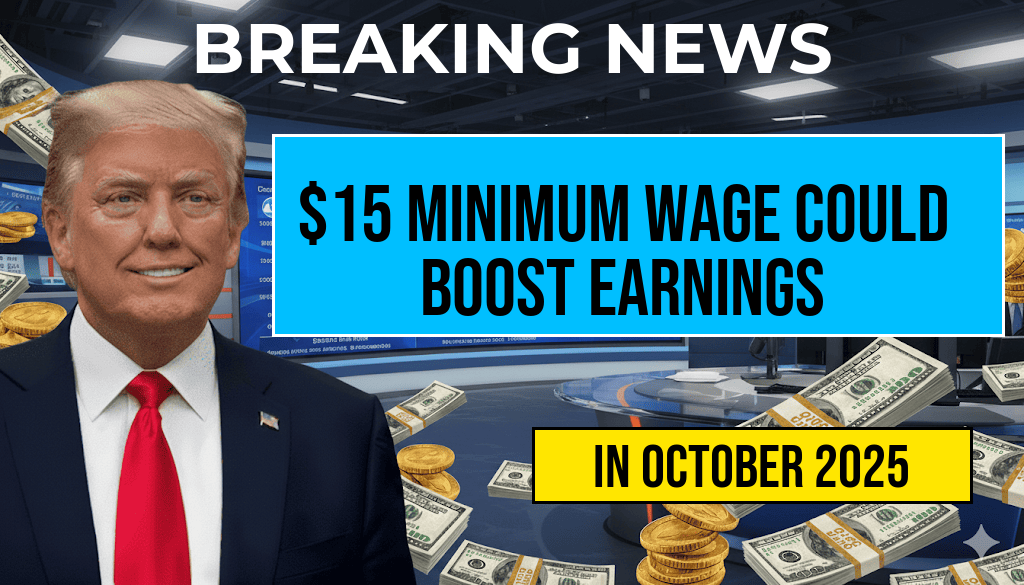A new analysis indicates that raising the federal minimum wage to $15 an hour could increase the annual earnings of approximately 32 million American workers by nearly $3,300 each. The study, conducted by economists at the University of California, Berkeley, projects that such a wage hike would impact a significant portion of the low-wage workforce, providing tangible financial benefits amid ongoing debates over minimum wage policies. While advocates argue that the increase could lift millions out of poverty and stimulate economic activity, opponents warn of potential job losses and increased costs for employers. The findings arrive at a time when policymakers are considering legislation that would mark the largest federal minimum wage increase in over a decade, reflecting the rising cost of living and broader economic pressures.
Projected Economic Impact of a $15 Federal Minimum Wage
Increased Earnings for Workers
| Number of Workers Affected | Average Annual Increase per Worker | Total Additional Earnings (in billions) |
|---|---|---|
| 32 million | $3,300 | $105.6 billion |
The study estimates that 32 million workers currently earning below or near the proposed $15 minimum could see their annual income rise by approximately $3,300. This figure accounts for workers across various industries, including retail, hospitality, and healthcare, where low wages are common. The cumulative increase would total over $105 billion annually, injecting additional purchasing power into local economies.
Potential Labor Market Effects
While the financial gains are substantial for many workers, the report also examines possible employment consequences. Economists highlight that some employers might respond by reducing hours, automating roles, or limiting new hiring to offset higher labor costs. However, the study suggests that the net effect on employment levels could be minimal, as increased consumer spending might stimulate demand for goods and services, ultimately supporting job retention and creation in other sectors.
Broader Economic Context and Policy Considerations
Historical Perspectives on Minimum Wage Increases
Previous federal minimum wage adjustments, such as the increase to $7.25 in 2009, have demonstrated mixed outcomes, with debates centered around their impact on employment and economic growth. Advocates argue that higher wages reduce poverty and improve worker productivity, while critics contend they could lead to higher prices and reduced employment opportunities for low-skilled workers.
Legislative Landscape and Public Opinion
Efforts to implement a $15 minimum wage have gained momentum nationally, with several states and cities already adopting such standards. The Biden administration has signaled support for raising the federal baseline, emphasizing the need to address inflation and economic inequality. Recent polls indicate that a majority of Americans favor increasing the minimum wage, viewing it as a step toward fairer compensation and economic justice.
Economic Theories and Expert Insights
Economists remain divided on the long-term implications of a federal minimum wage hike. Some assert that a moderate increase like $15 could stimulate economic activity without significantly harming employment levels, citing evidence from places where such policies have been enacted. Others warn that without accompanying measures, wage increases could strain small businesses and lead to unintended job cuts.
Supporting Data and Resources
- Economic Policy Institute report
- Wikipedia overview of minimum wage laws
- Forbes analysis on wage impacts
As discussions about minimum wage policies continue, the potential economic benefits for millions of workers are clear, yet the debate persists over balancing fair compensation with sustainable employment growth. The proposed $15 federal minimum wage could fundamentally reshape the income landscape for low-wage earners, fostering both economic opportunity and ongoing policy challenges.
Frequently Asked Questions
What is the proposed federal minimum wage discussed in the article?
The article discusses a proposed federal minimum wage of fifteen dollars per hour.
How many workers could benefit from the increase in the minimum wage?
Approximately thirty-two million workers could see benefits from the proposed minimum wage increase.
What is the estimated annual earnings boost for workers if the minimum wage is raised to fifteen dollars?
Workers could see an increase of about three thousand three hundred dollars in their annual earnings.
What are the potential economic impacts of raising the minimum wage to fifteen dollars?
The study suggests that raising the minimum wage could significantly boost workers’ earnings and potentially improve economic well-being for millions of Americans.
Does the article mention any considerations or potential drawbacks of increasing the minimum wage?
The article primarily focuses on the benefits of increased earnings but does not detail specific potential drawbacks or economic challenges associated with raising the minimum wage.

Leave a Reply